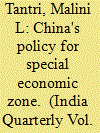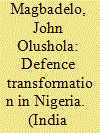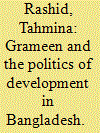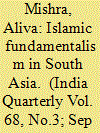|
|
|
Sort Order |
|
|
|
Items / Page
|
|
|
|
|
|
|
| Srl | Item |
| 1 |
ID:
115250


|
|
|
|
|
| Publication |
2012.
|
| Summary/Abstract |
Though India's SEZ policy owes its conceptual base to the successful Chinese SEZs' experience, hardly any attempt has been made to explain what made the latter so successful. In this article, we trace this phenomenal success to the well articulated and executed SEZ policy in China. Apart from this, the success of SEZs in China is also attributed to the various supporting mechanisms, both internal and external factors. On the basis of this analysis of different factors, we argue that SEZs cannot be expected to deliver optimum performance under ceteris paribus conditions; rather it requires careful identification and implementation of supportive factors, which may vary between countries, SEZs and/or between sectors within a given economy.
|
|
|
|
|
|
|
|
|
|
|
|
|
|
|
|
| 2 |
ID:
115251


|
|
|
|
|
| Publication |
2012.
|
| Summary/Abstract |
The quest to modernise the Nigerian armed forces has gone beyond mere declaration of policy intent by the Nigerian government. Processes for defence transformation have entailed the establishment of relevant committees to generate blueprints for actualising the initiative. The prospects of defence transformation can be seen in the efforts of the leadership of the armed forces to implement the various recommendations of the transformation committees as well as the incorporation of the requirements of the armed forces in the long-term perspective plan of the government, in addition to the palpable commitment of the country's National Assembly to appropriate requisite financial resources to the defence sector. Regardless of these prospects, certain structural and institutional problems which could hinder the realisation of the objectives of defence transformation still exist. These include wrong deployment of personnel to the Ministry of Defence (MOD), the dichotomy between MOD and Defence Headquarters (DHQ), lack of transparency in procurement and project implementation, among others. However, the main goal of transforming Nigerian armed forces has regained renewed salience in the face of the challenging security concerns which the recent terrorist onslaught against the Nigerian state portends. Therefore, the issue is not the desirability or otherwise of defence transformation, but whether it is achievable in spite of all the odds against it.
|
|
|
|
|
|
|
|
|
|
|
|
|
|
|
|
| 3 |
ID:
115249


|
|
|
|
|
| Publication |
2012.
|
| Summary/Abstract |
Bangladesh is one of the countries with a thriving political culture, vibrant civil society and a huge development sector, yet struggling with the issues of persisting poverty as a substantial majority still lives below the poverty line. The development sector has largely maintained an apolitical posture focusing on expanding their outreach, commercial enterprises and access to donor assistance. As a consequence of new economic realities and dynamics of financial markets at local and global level, the sector is increasingly being pushed to expand its influence in the local power structures, thus shifting the nature of their relationship-from a non-engaged to an actively engaged relationship with the state. This article would argue that the increasing commercial/entrepreneurial activities are reshaping the development sector in Bangladesh, even overhauling the dynamics of the socio-economic and political scene. As these not-for-profit organisations are entering into a state-regulated sector, in which other actors (business houses) are already operating, lobbying to protect similar commercial interests, there are contestations around regulatory regimes and political agency in policy-making arenas. Recent controversy around Yunus's role in the Grameen Bank is indicative of the shifting nature of developmental politics.
|
|
|
|
|
|
|
|
|
|
|
|
|
|
|
|
| 4 |
ID:
115253


|
|
|
|
|
| Publication |
2012.
|
| Summary/Abstract |
Islamic fundamentalism is a multifarious movement with diverse manifestations, components, and contextual historical and societal conditions. While the radical Islamists, for instance, seek to impose change from above through holy wars, others pursue a bottom-up approach to bring about the re-Islamisation of the society through extensive networks of social activity. Regardless of their particularistic properties, all Islamist groups, however, share a common goal of establishing an Islamic order (nizam Islami) for the actualisation of Muslim life. The fundamentalists may not have registered considerable success in electoral terms, but they continue to dominate political discourse because their message is capable of attracting a broad spectrum of society. On the basis of a broad understanding of Islamic fundamentalism as a religio-political movement, this article attempts a comparative study of the phenomenon in Pakistan and Bangladesh, two leading Muslim states of South Asia. By examining the historical and social context, internal political developments including the role of state in promoting religious agenda and the varying impact of extraneous factors, the article argues that while Islamic fundamentalism in Bangladesh is containable, accomplishing it in Pakistan will be difficult because of the state appropriation of Islam in political discourse guaranteeing the movement's staying power.
|
|
|
|
|
|
|
|
|
|
|
|
|
|
|
|
| 5 |
ID:
115252


|
|
|
|
|
| Publication |
2012.
|
| Summary/Abstract |
India and Bangladesh have signed the Ganga/Ganges River Water treaty in December 1996. The Ganga Water treaty is cited as one of the important examples of peaceful negotiations between upstream and downstream neighbours in South Asia. The present article revisits the Indo-Bangladesh Ganga Water politics and understands the political dynamics which led to the signing of the treaty between the two countries. The reading of the negotiation process since beginning to the present time suggests that though the technical nature of the problem remains the same, a change in domestic politics facilitates or obstructs the negotiation process. Since India and Bangladesh share another 53 rivers, it is important to learn a successful mechanism from the negotiation of 1996 which can be applied to other river issues. The article is based on primary as well as secondary sources.
|
|
|
|
|
|
|
|
|
|
|
|
|
|
|
|
|
|
|
|
|